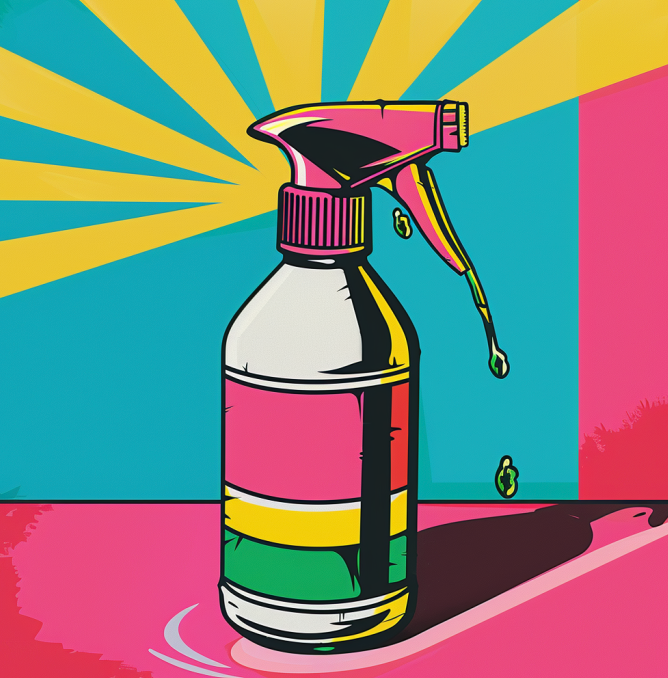

· By Kirsten Karchmer
Why You Should Avoid Roundup and Opt for a DIY Weed Killer
Why You Should Avoid Roundup and Opt for a DIY Weed Killer
When it comes to maintaining a beautiful garden or a weed-free lawn, many people reach for herbicides like Roundup. However, there is growing concern about the safety and environmental impact of this widely used product. Roundup, which contains the active ingredient glyphosate, has been linked to various health issues, environmental damage, and fertility problems.
Here’s why it might be time to consider a safer, DIY weed killer alternative.
Cancer Risk
Glyphosate has been classified as "probably carcinogenic to humans" by the International Agency for Research on Cancer (IARC). Studies have linked glyphosate exposure to an increased risk of non-Hodgkin lymphoma and other cancers.
Liver and Kidney Damage
Long-term exposure to glyphosate has been associated with liver and kidney damage. Research indicates that childhood exposure to glyphosate is linked to liver inflammation and metabolic disorders.Hormonal Disruption
Endocrine Disruption
Glyphosate can mimic or interfere with the body's hormones, leading to developmental, reproductive, and immune system problems. It can alter the biosynthesis of sexual hormones, impacting various hormonal pathways.Breast Cancer Risk
High concentrations of glyphosate can mimic estrogen, potentially increasing the risk of breast cancer.
Fertility Issues
Male Fertility
Glyphosate exposure can negatively affect sperm motility and DNA integrity, leading to fertility issues.Female Fertility
Glyphosate can cause hormonal imbalances and affect the development of the female reproductive system, leading to implantation failures and increased embryo losses.
Environmental Impact
Biodiversity Loss
Glyphosate can lead to a loss of biodiversity, making ecosystems more vulnerable to pollution and climate change.
Soil and Water Contamination
Glyphosate can persist in soil and water, leading to long-term environmental contamination and affecting non-target organisms.
DIY Healthy Weed Killer
Given the potential risks associated with glyphosate, many are turning to safer, homemade alternatives for weed control.
Here’s a comprehensive guide to making a DIY weed killer.
Ingredients
- 1 gallon of white vinegar (5% acetic acid)
- 1 cup of salt (table salt or Epsom salt)
- 1 tablespoon of liquid dish soap
Instructions
- Mix Ingredients: Combine the vinegar, salt, and dish soap in a large container. Stir until the salt is fully dissolved.
- Transfer to Spray Bottle: Pour the mixture into a spray bottle for easy application.
- Application: Spray the solution directly onto the weeds, ensuring thorough coverage. The best time to apply is on a sunny day, as the heat will enhance the effectiveness of the solution.
Safety Precautions
- Protective Gear: Wear gloves and eye protection when handling the solution, as vinegar can cause skin and eye irritation.
- Avoid Contact with Desirable Plants: This solution is non-selective and can harm any plant it comes into contact with. Be careful to target only the weeds.
- Wind-Free Application: Apply on a wind-free day to prevent the solution from drifting onto other plants.
FAQ
Q: How does vinegar kill weeds?
A: Vinegar contains acetic acid, which draws moisture out of the weeds, causing them to dry out and die.
Q: Can this solution harm my soil?
A: While vinegar and salt can affect soil health, using the solution sparingly and targeting only the weeds can minimize the impact.
Q: Is this solution safe for pets and children?
A: Yes, this solution is safer than chemical herbicides, but it should still be used with caution. Keep pets and children away from treated areas until the solution has dried.
Q: How often should I apply the solution?
A: You may need to apply the solution multiple times to fully kill the weeds, especially for more resilient species.
Q: Can this solution burn my skin?
A: Yes, vinegar with high acetic acid content can cause skin burns. Always wear protective gear when handling the solution.
Conclusion
While glyphosate-based weed killers are effective, their potential health risks and environmental impacts cannot be ignored. By opting for a DIY weed killer, you can protect your health, support fertility, and safeguard the environment. Embrace this simple, natural solution for a healthier and more sustainable approach to weed control.
Looking for a place to source everything you want and need for a clean home and environment?
Head over to www.thecleancabinet.com to shop our curated fav products at super affordable prices.
We think you deserve that!
Want to Start Improving Your Fertility?
Meet your new, 100% personalized, available 24/7 fertility coach, Kirsten AI. She will help you identify all of the underlying issues impacting your fertility, make a plan to fix them and support you day in and out on your journey to motherhood.